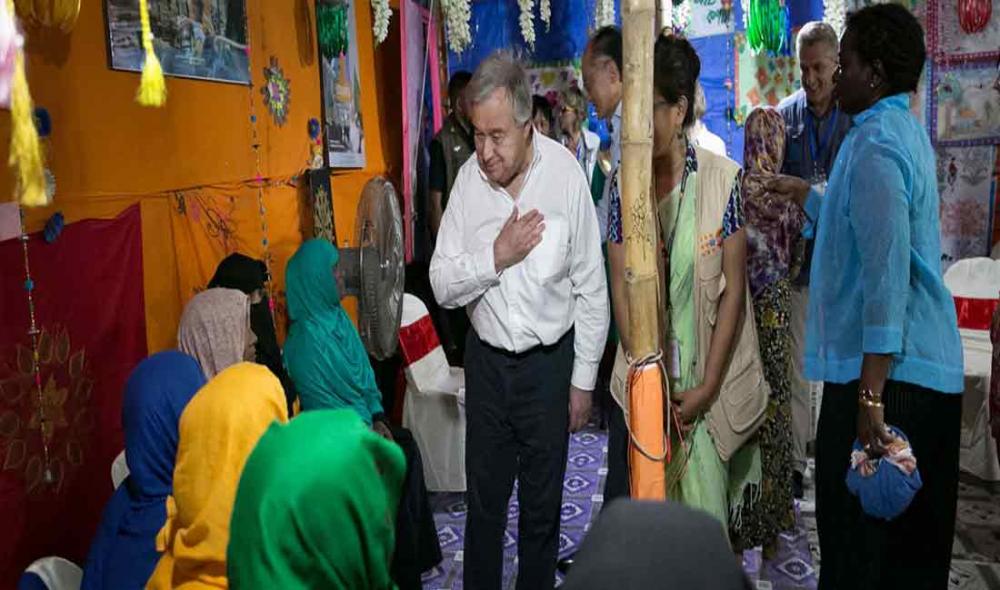Just Earth News | @JustEarthNews | 16 Aug 2018, 05:59 am Print

UNFPA Bangladesh/Allison Joyce
New York,As the world’s problems grow, multilateralism represents to best path to meet the challenges that lie ahead, said United Nations Secretary-General António Guterres on Tuesday, launching his annual report.
The Report of the Secretary-General on the Work of the Organization for 2018, also tracks the progress made over the last year in maintaining peace and security, protecting human rights, and promoting sustainable development.
“I started my tenure calling for 2017 to be a year of peace, yet peace remains elusive,” said the UN chief in the report’s introduction, noting that since January last year “conflicts have deepened, with grave violations of human rights and humanitarian law; inequality has risen, intolerance has spread, discrimination against women remains entrenched and the impacts of climate change continue to accelerate.”
“We need unity and courage in setting the world on track towards a better future,” stressed Guterres, crediting the Sustainable Development Goals (SDGs) for generating coordinated efforts by Member States and civil society to “alleviate poverty and build peaceful, prosperous and inclusive societies.”
Wide-ranging reform
The most comprehensive reform of the UN development system in decades already underway, led by Guterres and his deputy, Amina Mohammed, aims to strengthen the Organization’s capacity to support Member States in achieving the 17 SDGs.
While the report points to gains, such as increased labour productivity, access to electricity and strengthened internet governance, it also illustrates that progress has been uneven and too slow to meet the 2030 Agenda for Sustainable Development Goals within the given time frame.
The report underlines the importance of building stronger multilateral partnerships with Member States; regional and international organizations; and civil society; to “find solutions to global problems that no nation alone can resolve.”For example, in 2015, three out of 10 people did not have access to safe drinking water, and 60 per cent lacked safe sanitation. Moreover conflicts, disasters and climate change are also adversely affecting populations.
Although the 2018 High-Level Political Forum on Sustainable Development of 2018 reflected some positive initiatives, it also showed the urgent need to step up efforts in areas such as energy cooperation, water and terrestrial ecosystems.
According to the report, “partnerships are key to achieving the SDGs” – and as of June, 3,834 partnerships had been registered with the Partnerships for the SDGs online platform from different sectors across all the 17 goals.
With regard to technology, last October a joint meeting of the Economic and Social Council (ECOSOC) and the Second Committee welcomed Sophia, the first robot to sit on a UN panel. This gave a glimpse into the advances being made in the realm of Artificial Intelligence.
Turning to young people, UN Youth Envoy, Jayathma Wickramanayake, of Sri Lanka, is continuously advocating for their needs and rights, including in decision-making processes at all levels, and in strengthening the UN system’s coordination on delivering for youth, and with their increased participation.
The UN report also spoke to the growing scale, complexity and impact of global migration. In July, the General Assembly agreed a Global Compact for Safe, Orderly and Regular Migration, which will be presented for adoption in December at an Intergovernmental Conference in Morocco.
- UN officials says UK’s newly passed ‘Safety in Rwanda’ bill is anything but safe
- Israel-Palestine war: UN rights office says mass graves in Gaza show victims' hands were tied
- Pakistan: UN experts express concern over lack of protection for minority girls from forced religious conversions, marriage
- Forty percent Pakistanis are currently living below the poverty line, says World Bank
- Hindu girl abducted in Pakistan, community members slam authority






